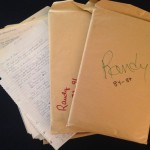 I received one of the most unusual gifts ever for my birthday this year. Wrapped in gold paper and tied with a gold ribbon, the package came with a note: “words—no matter when written—are gold, both to the reader and the composer.” High expectations. Inside were four large envelopes, each half an inch thick, with my name and dates from 1981 to 1991.
I received one of the most unusual gifts ever for my birthday this year. Wrapped in gold paper and tied with a gold ribbon, the package came with a note: “words—no matter when written—are gold, both to the reader and the composer.” High expectations. Inside were four large envelopes, each half an inch thick, with my name and dates from 1981 to 1991.
As I pulled the contents from the oldest envelope, I discovered a stack of hand-written letters I sent my parents beginning when I was seventeen.
I’m curious, intrigued, and a bit scared to pore over those letters. I’m not sure if I want my wife and kids to read them. (The note even came with the warning, “Some may be tempted to chuckle—or even laugh aloud—if you share your letters.”) I know some of who I was and what I experienced during that decade, and not all of it was pretty. I struggled with the same things other young people have struggled with throughout history: girls, parents, jobs, the future, God. I didn’t struggle as much as I probably should have with other things: my own arrogance, my well-developed legalism, selfishness.
In spite of my fears, part of me can’t wait to read my own correspondence. What was important in those years? What brought me joy and hope? What light will I find to illuminate dark areas of my life today? Where will I find wisdom…and foolishness? Will there be the predicted gold in my own words?
But another thought came to me this morning, too: what—and how—would I have written if I had known my letters would be saved?
Every few years I get interested in my family’s history. I have waded into the stories that were a gift from my grandfather twenty years ago, and from my own parents in the past few. I’ve wanted to give a similar gift to my own children, and have already begun to write some of those stories for them; undoubtedly these four envelopes will fill in gaps in my memories, offering both details and insights that have been relegated to the darkest corners of my mind.
The pages in these envelopes will serve as candles in those dark corners, but candles offer scant light; much will lay yet hidden in flickering shadows—the context of my life in which each letter was written. Much happened over the decade represented there: leaving home for the first time, college (twice), an entire military career, dating and engagement; I lived in Seattle, Los Angeles, England, and San Diego; I loved and left God, then came back to him.
Had I tried to tell the story of my life as it happened, I would undoubtedly have written differently; only reading what I did write will give clues to how I might have written. Which makes me think of some other writers: those whose words we read and study and meditate on today as Holy Scripture.
Did Paul know he was writing not only to a few churches in the Roman Empire, but to generations of Christians for more than two thousand years? Did the four gospel writers have any idea that theologians would pick apart their words—and the similarities and differences between them—to see who copied whom? Did they recognize the impact made by the unique writing styles of a tax collector, a physician, a fisherman, and disciple’s assistant?
One of the most amazing things about the Bible—one of the compelling evidences of its authenticity—is that its writers made little apparent effort to present themselves in the best light.
Moses, author of the first five books of the Bible, does not hesitate to write of his own sins: murder, disobedience, anger. Jeremiah records his inadequacy for the role of prophet with the same veracity as the prophecies themselves. Paul at times seems to stress his own weaknesses and spiritual struggles as much as God’s power in and over them.
As I write, America is deep into an election cycle overflowing with both candidates and mud. Debates are as blustery as a New England Nor’easter. Honesty and openness are as wanting as humility—apparently, they don’t get you far in a political campaign. Men and women vying for the chance to fix a desperately broken nation seem to believe that vain promises and political posturing offer that hope. How wrong they are. How empty their words.
Maybe my mom’s note was only partly true. Maybe not all words are gold; maybe some are clay, destined to dry up and crumble with the passing of time.
But words of honesty and openness—words spoken (or written) without pretense or vanity or the illusion of endurance… these are gold.
As I pore over my own words long ago, I expect I’ll find a lot of clay: promises of undying love long since buried; dreams that dispersed with the alarm of a distant clock. But perhaps buried in the midst of the clay will be a few words of gold, too—a treasure to be found only by taking up my pick and shovel and digging into those overstuffed envelopes.

